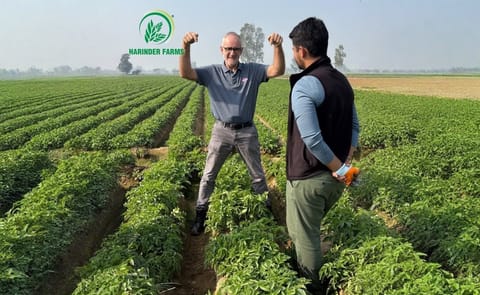Potato Crisis Deepens in India as Bengal-Centre Rivalry Escalates
Potato Crisis Deepens in India as Bengal-Centre Rivalry Escalates

The ongoing potato crisis in India has taken a political colour with the West Bengal government stopping supply to states where, incidentally, the Bharatiya Janata Party (BJP) is in power. The BJP heads the federal government, with Narendra Modi as the Prime Minister. It is also in power in 17 states and union territories out of 36.
West Bengal is ruled by the Trinamool Congress (TMC), which opposes the BJP. Its 69-year-old leader, Mamata Banerjee, a key opposition leader often seen as the Prime Minister material, has been West Bengal's Chief Minister since 2011. West Bengal, India's second-largest potato-producing state, has put an embargo on the supply of potatoes to other states. It is unprecedented, given the homogenous nature of business and the free movement of products across India.
West Bengal, which produces about 12.5 million tons of potatoes annually, supplies almost 70% of the yield to other states, chiefly neighbouring states, including seven North-Eastern (NE) states. The NE states, which have a population of about 45 million, are closer to Bhutan, from where India has recently allowed unlicensed imports till June 30, 2027. In mid-July, the West Bengal government headed by Chief Minister Mamata Banerjee, seen as a close rival of Prime Minister Narendra Modi, announced the embargo on the potato supply to outside West Bengal.
Soon, reports started pouring in that hundreds of trucks loaded with potatoes en route to the NE states (Arunachal Pradesh, Assam, Manipur, Meghalaya, Mizoram, Nagaland, Tripura, and Sikkim) were stranded at the border between West Bengal and Assam, the gateway to the NE region. Prime Minister Narendra Modi's party, the BJP, is in power in seven out of the eight states in the NE region. The West Bengal government's ban on potato supply to the NE states meant denying West Bengal's potatoes to BJP-ruled NE states.
However, the NE states got relief from soaring potato prices and scarcity by importing potatoes from Bhutan, a decision facilitated by the federal government headed by PM Modi. The latest news reports suggest that the potato imported from Bhutan has not only met the demand in the NE states but also entered bordering West Bengal districts, where these potatoes are favoured for better taste and lower prices. Does this mean the West Bengal government has been defeated on its turf? The answer is no!
Odisha, another neighbour with 45 million people ruled by the BJP, also had its potato supplies stuck at the borders without notice. Odisha consumes about 1 million tons of potatoes annually, while its domestic production meets only about 20% of its demand. To meet its demands, it buys potatoes from West Bengal. In the changed circumstances, the only state Odisha can expect to buy potatoes is Uttar Pradesh, the largest potato-producing state in India and currently ruled by the BJP. However, the distance from Uttar Pradesh to Odisha is significantly greater than from West Bengal, a factor that will impact the affordability of the spud.
A considerable amount of politics played out in Odisha, as an important opposition leader wrote a letter requesting the West Bengal Chief Minister requesting her to allow the supply of potatoes to Odisha. The Odisha Chief Minister, Mohan Charan Majhi, discussed the issue on the sidelines of a meeting. But the West Bengal Chief Minister Mamata Banerjee has not relented.
As West Bengal produces more potatoes than it consumes, a potato farming and business ecosystem has evolved over the years. The West Bengal government's decision to stop potato supply to other states is hurting the ecosystem and affecting business, potentially causing heavy losses to farmers and traders. In a quick reaction, West Bengal traders went on a strike, threatening to stop potatoes from reaching the local markets. Traders buy potatoes stored by farmers at cold stores, take them to the market, and sell them for a profit.
As traders were on strike, a critical logistical link in the supply chain went missing. The state government decided to buy potatoes from the farmers at the cold stores and roped in self-help groups (SHG) to take the potatoes to the market. On the day this transition was implemented, when potato prices were still high, the West Bengal government bought 15,000 bags, each containing 50 kg of potatoes, and supplied them to the markets in Kolkata, the state capital.
The efficiency with which the state government took the potato supply situation under its control and stabilized the price in the local markets made the traders call off their strike and cooperate with the government. Although a new potato crop is expected next month, the major potato season begins in November and lasts until March. While the fresh supply in August might cool the prices to some extent, a more reassuring relief could be expected only in November. Until then, Indian politics might see some interesting moves and counter-moves involving potatoes.








